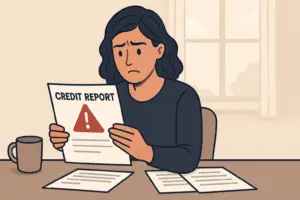When most people hear the words, “identity theft” they conjure up images of someone in a distant location, randomly searching the internet for credit card and bank accounts to hack, or perhaps someone stealing their mail. While these scenarios are not uncommon, another category of identity theft—fraud by family members, including ex-spouses and ex-partners—is growing each year. Family fraud comes in many different forms, and sadly, many families have experienced this type of identity theft.
What is Family Fraud?
It may be difficult to imagine someone stealing from friends and family, but certain situations create opportunities that can lead to desperate acts. Whether motivated by greed, anger, bitterness, or drastic circumstances, some people find a way to justify family theft.
As consumer protection lawyers, we focus on the financial and credit implications that arise from family theft, not potential criminal charges.
Consumer-oriented federal laws protect all identity theft victims, regardless of family connection. A current spouse, an ex-spouse, or another family member can be considered an identity thief if they use someone else’s personal information for financial gain. If you are a victim of family theft, you may have rights under a variety of federal consumer protection statutes, including the Fair Credit Reporting Act (FCRA) and the Electronic Fund Transfer Act (EFTA).
Possible Types of Fraud in the Family
A variety of family relationships can lead to one family member using another’s credit or debit card without permission or opening new accounts without the other family member’s knowledge. Family identity theft situations may arise between married couples, in elder-care arrangements, and even innocent children can be victims of identity theft.
Spousal Identity Theft
The most common form of family-related identity theft occurs between spouses or ex-spouses. During a typical marriage, both parties share personal information, social security numbers, bank accounts, and other security details. Spouses may even share PINs and passwords with each other.
With access to this information, a spouse might incur charges on the other spouse’s accounts; open new credit card accounts in the other spouse’s name, take out joint loans, finance a car, and clean out bank accounts. The thief may have a spending, gambling, or other addiction to fund, or they may be acting out of spite. Divorce can bring out the worst in a person and identity theft after divorce can include falsifying documents, forging signatures, or taking other illegal steps to punish their soon-to-be ex-spouse.
Spouses may even prevent one another from receiving billing statements, either by intercepting the mail before it is reviewed by the innocent spouse, or by having it re-routed to another address, such as an office address.
We recently filed a federal lawsuit on behalf of a husband whose soon-to-be ex-wife forged his signature on several student loans without his permission. The case is brought against the loan providers and the credit reporting agencies who have violated federal laws and caused our client substantial financial and personal harm.
Incapacitated Elder Family Members and Caregivers
Sometimes adult family members provide care for an elderly parent or grandparent. As a result, they may have access to bank account statements, credit card numbers, mail, and other financial information that allows them to run up credit card bills in the victim’s name or steal money from the victim’s accounts.
In extreme cases, the younger caregiver may even threaten physical harm against the elderly family member to force them to sign documents or turn over information. While these actions qualify as criminal Elder Abuse, the victim may also have identity theft victim rights under the FCRA, EFTA or other consumer protection statutes, to get their money back depending on how the theft occurred.
Child Identity Theft
According to a Child Identity Fraud Study by Javelin Strategy and Research, the incidence of child identity theft is rising, and the associated costs are nearly $1 billion each year. It is estimated that identity theft affects one child out of every fifty and it can take years to resolve. Often, the child victim doesn’t realize the fraud until they apply for college or try to acquire a first credit card.
Unrelated cyber thieves can steal a child’s identity through social media, online shopping, and even during remote learning. Javelin’s study shows students are four times more likely to have their identity stolen than the general public.
However, in 27% of child identity fraud cases, the perpetrators were family members or close friends. Sometimes a parent will use their child’s identity to open a utility account, get a new credit card, or take a loan when their own credit won’t qualify. These parents justify their actions as a means to provide for the family, but they don’t realize the problems they are causing their child.
Victims of Family Fraud Have Rights
A situation where a family member is stealing from friends and family is no different than dealing with an anonymous identity thief you’ve never met. If you are a victim of fraud in the family, these steps will help you protect yourself:
- Contact the creditor immediately and dispute the charges. If your initial contact is by phone, follow up immediately with a written dispute, providing supporting documents whenever possible.
- Place a fraud alert on your three major credit reports to notify anyone searching your reports that you are disputing an account.
- Consider freezing your credit while your fraud investigation is pending to prevent any further fraudulent credit applications (although this will keep you from acquiring credit until you lift the freeze).
- Dispute all unauthorized and fraudulent accounts on your credit reports and ask the reporting agencies to remove that information.
- File a fraud report with your local law enforcement department and provide a copy to the creditors and credit bureaus involved.
- File an identity theft report with the Federal Trade Commission online at IdentityTheft.gov, and provide copies to the creditors and credit reporting agencies.
- Resist other family members who try to discourage you from pursuing your rights to protect the relative at fault.
- If your money is not returned and your credit report is not corrected after sending disputes to the credit reporting agencies and creditors, promptly contact an experienced consumer protection advocate with experience fighting for victims of identity theft facing unauthorized debt and charges.
Don’t Face Family Fraud Alone
At Schlanger Law Group, our consumer protection lawyers understand family fraud matters are complicated and delicate. We are compassionate and dedicated advocates, with deep experience litigating on behalf of victims of identity theft committed by family members and others. We are ready to protect your rights.
Call (212) 500-6114 or fill out this simple online form to schedule a free case consultation to discuss your unique situation.







